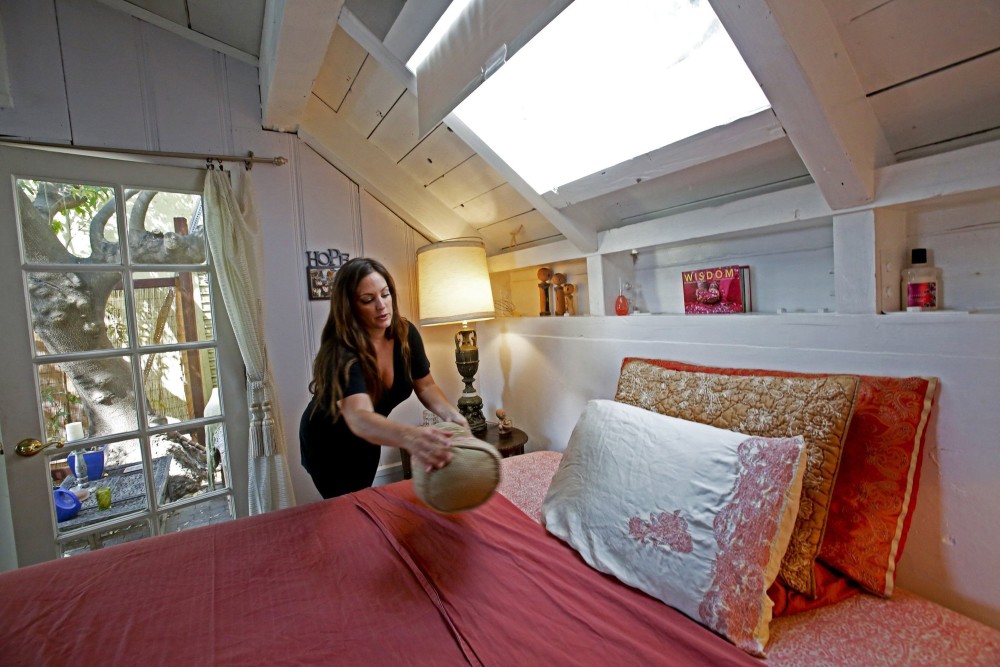OPINION
By Debra J. Saunders
San Francisco Chronicle.
Both proponents and opponents of San Francisco’s “Airbnb measure” — Proposition F — see the November ballot initiative as a David-versus-Goliath contest. Both sides also see themselves as David. And both sides have a point.
The measure would impose additional restrictions on short-term rentals. Supporters can claim to be the little guys because the deep-pockets opposition — headlined by the home-sharing technology platform Airbnb — has $8 million to bury the less than $400,000 raised by the “yes” campaign, according to proponent Dale Carlson.
Prop. F does have high-profile supporters, notably Sen. Dianne Feinstein, but when the other side outspends you 20-1, you can call yourself the underdog.
The No on F folks also stand for the little guy (or gal) who rents out a guest room to make ends meet.
San Francisco Supervisor Scott Wiener opposes the measure because “more and more of my constituents” rely on Airbnb.
Many are women, often older women, who are “house poor” and could not afford to buy the homes they bought years ago. They don’t want to take on a full-time roommate; they also enjoy the energy young travelers bring with them. “The one thing they have is that spare bedroom,” Wiener told The Chronicle Editorial Board last month. If Prop. F passes, “they are going to get thrown under the bus.”
The Yes on F folks have a populist message. As former San Francisco City Attorney Louise Renne put it, “The short-term rentals, in my view, are reducing the housing stock.” Tourists don’t belong in residential neighborhoods, the Yes side adds.
Speculators are buying properties so that they can cash in by setting up pseudo hotels that aren’t up to code. Something must be done.
Their remedy, however, threatens to cut into the income of middle-class residents — people like architect Kepa Askenasy, who told me last year she was “just trying to survive in this beautiful city and do it in a way that’s positive for everybody.”
Since City Hall adopted legislation championed by former Supervisor David Chiu, she registered with the city and pays the 14 percent hotel tax. Airbnb now pays about $1 million each month in taxes. Askenasy is proud that the San Francisco startup also threw in some $25 million that would have been levied as taxes if the Chiu legislation took effect earlier. Now, she said Thursday, critics should give the new rules time to work.
What really frosts Askenasy is that a small group of city big shots wants to cut into her side business on the grounds that there is not enough affordable housing. City Hall failed to ensure there would be more homes for working residents. Large-scale developers did not build those homes. Somehow the Yes on F folks are blaming the sharing economy — that is, entrepreneurial San Franciscans — for a housing shortage.
Keith Freedman rents out a spare bedroom and a Murphy bed in his apartment living room. He told me, “Most of the guests I get couldn’t afford to come to San Francisco and stay in a hotel.” Gag Airbnb, and San Francisco becomes a town for well-heeled tourists only.
If Prop. F passes, big government will dictate what people cannot do in their own bedroom — rent it out.
I was a little surprised to see Janan New of the San Francisco Apartment Association on the Yes team. I thought it was in landlords’ interest to push back against over-regulation. Her businesses have to comply with rent control and have invested a lot of money to comply with building codes. It’s only fair to level the playing field for property owners (and their tenants) who have met the city’s high bar. When San Francisco rushed into the sharing economy, New added, “It was like the wild, wild West.
buy forzest generic buy forzest online no prescription
”
San Francisco was born of that wild, wild West. Adventurous souls scraped together enough coin to reach a new town that oozed opportunity. How did this city become a stuffy parlor where locals invite the wrath of the law if they rent a room to Norwegian tourists who stay out late and talk too loud?
The current law
Restricts the right to offer a residential unit for short-term rental to permanent city residents.
Requires hosts to register with the city.
Forbids a permanent resident to rent a residential unit on a short-term basis for more than 90 days per year if the resident does not live in the unit.
Does not limit the number of days for short-term rentals if the resident lives in the unit during the rental period.
Subjects short-term rentals to San Francisco’s hotel tax.
Proposition F
Limits short-term rentals of a unit to 75 days per year, regardless of whether rental is hosted or unhosted.
Requires proof that the unit’s owner authorizes using the unit as a short-term rental.
Requires short-term hosts to submit quarterly reports on the number of days they live in the unit and the number of days the unit is rented
Mandates that the city post notice on buildings with a unit approved for short-term rentals and notify by mail owners, neighbors of the unit and interested neighborhood organizations.
Source: Ballot Simplification Committee














































































































































































































































































































































































